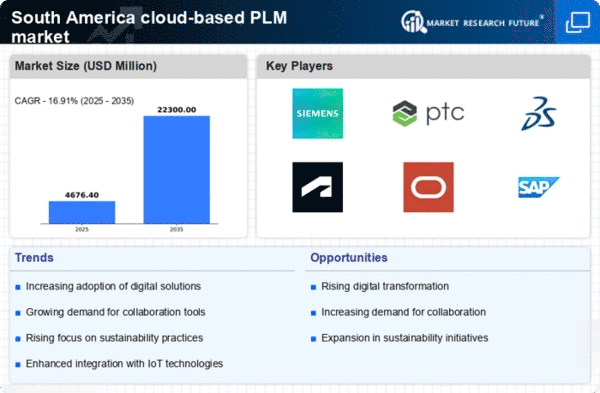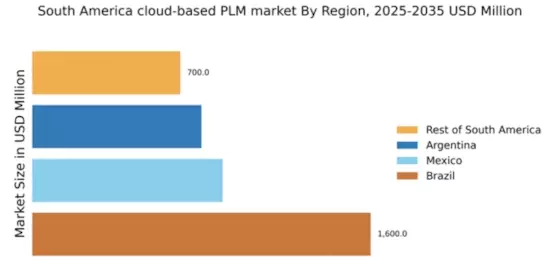Growing Focus on Data Security
Data security is emerging as a paramount concern for organizations in South America, driving the cloud based-plm market. With the increasing digitization of processes, companies are prioritizing the protection of sensitive information related to product development and intellectual property. Cloud service providers are responding to this demand by implementing robust security measures, including encryption and multi-factor authentication. A recent report suggests that 75% of businesses in South America consider data security a critical factor when selecting a cloud based-plm solution. This heightened focus on security not only fosters trust among users but also encourages wider adoption of cloud technologies in the region.
Cost Efficiency and Scalability
Cost efficiency remains a critical driver for the cloud-based PLM market in South America. Organizations are increasingly recognizing the financial advantages of cloud solutions, which often require lower upfront investments compared to traditional on-premises systems. The subscription-based model of cloud services allows companies to scale their PLM capabilities according to their needs, reducing unnecessary expenditures. Furthermore, a study indicates that businesses utilizing cloud based-plm solutions can achieve cost savings of up to 30% in operational expenses. This financial flexibility is particularly appealing to small and medium-sized enterprises (SMEs) in South America, enabling them to leverage advanced PLM functionalities without the burden of significant capital outlay.
Support for Regulatory Compliance
The cloud based-plm market in South America is being propelled by the need for regulatory compliance across various industries. As governments implement stricter regulations regarding product safety, environmental standards, and data protection, organizations are compelled to adopt PLM solutions that facilitate compliance. Cloud based-plm systems offer features that help track compliance requirements and ensure adherence to industry standards. This is particularly relevant in sectors such as pharmaceuticals and food production, where regulatory scrutiny is intense. Recent findings indicate that approximately 55% of companies in South America view compliance capabilities as a key driver for their investment in cloud based-plm solutions, underscoring the importance of regulatory alignment in the market.
Integration with Emerging Technologies
The integration of emerging technologies is significantly influencing the cloud-based PLM market in South America. Technologies such as artificial intelligence (AI), machine learning (ML), and the Internet of Things (IoT) are increasingly being incorporated into PLM systems, enhancing their capabilities. This integration allows for improved data analytics, predictive maintenance, and real-time monitoring of product lifecycles. As a result, companies can make more informed decisions and optimize their operations. Recent surveys indicate that around 40% of organizations in South America are actively seeking PLM solutions that offer compatibility with these advanced technologies, highlighting a clear trend towards innovation in the cloud based-plm market.
Rising Demand for Remote Collaboration
The cloud-based PLM market in South America is experiencing a notable surge in demand for remote collaboration tools. As organizations increasingly adopt flexible work arrangements, the need for effective collaboration solutions becomes paramount. This trend is particularly evident in industries such as manufacturing and design, where teams are often dispersed across various locations. The ability to access product lifecycle management tools from any device with internet connectivity enhances productivity and streamlines workflows. According to recent data, approximately 65% of companies in South America have reported an increase in remote collaboration initiatives, driving the adoption of cloud based-plm solutions. This shift not only facilitates real-time communication but also fosters innovation, as teams can collaborate seamlessly regardless of geographical barriers.


















